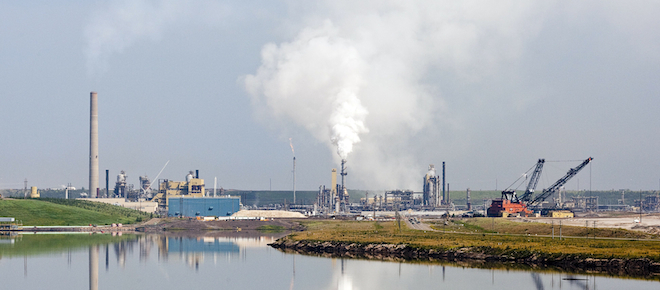Why do we let the Prime Minister schedule by-elections?
And why did so few people vote in Fort McMurray-Athabasca?
Mark Blinch/Reuters
Share

Fort McMurray-Athabasca can apparently claim the worst federal by-election turnout in modern history. With 202 of 203 polls reported in, precisely 15.19 per cent of eligible voters are reported to have cast a ballot.
So how badly should we feel about this?
There is some history here to note. Previous to this week, Fort McMurray-Athabasca had the worst turnout of any riding in the general elections of 2011 (40 per cent), 2008 (36 per cent) and 2006 (48 per cent). In 2004, it registered the 13th-lowest turnout (48 per cent), in 1997 it was third-worst (49 per cent), in 1993 it was 20th from the bottom (60 per cent) and in 1988 it was the 25th worst (70 per cent). Its best showing was 2000, when it boasted merely the 45th smallest turnout (56 per cent).
(All of those numbers courtesy of Pundits Guide.)
So in addition to the general history of by-elections drawing lower turnouts and the wider, long-term decline of turnout in Canada, there is also something specific to Fort McMurray-Athabasca—perhaps something to do with the “transient” nature of the population in the wake of the oil sands boom.
All of which likely boded ill for turnout in this by-election. And then the final day to vote was scheduled for June 30, the Monday between a weekend and Canada Day.
It’s impossible to say precisely how much the date particularly impacted turnout, but, anecdotally, there seems to be some blame.
One of the biggest factors this time, according to some residents, was the timing. Each of the MP candidates noted that by-elections see lower turnouts, but holding this by-election between Canada Day and a weekend meant many residents weren’t present to cast their ballots.
“I thought it was kind of a sham that they had a vote over the long weekend when people were obviously going to be away,” Fort McMurray resident Ryan Chester said. “It definitely lowered [voter turnout] for sure. Speaking to some of my classmates and other people I know, they were definitely in Edmonton or camping or whatnot over the weekend and didn’t do advanced polling.”
At the very least, June 30 seems like a less-than-ideal day to hold a vote. Like if you were thinking of when would be most sensible for the purposes of seeing people vote, it wouldn’t be your first choice.
So who’s idea was it to have a vote on June 30? It was Stephen Harper’s. Under our system, it is the Prime Minister who, pursuant to certain limits contained in the Parliament of Canada Act and the Canada Elections Act, effectively controls when a by-election is held.
In most cases over the years, multiple vacancies have been grouped together for votes. That alone leads to a certain absurdity. In the case of Monday’s by-elections, the four seats being filled had been vacated on April 2, March 13, Jan. 17 and Nov. 9 respectively. Meanwhile, a seat vacated on April 10 (Whitby-Oshawa, after the death of Jim Flaherty) remains vacant and could be unfilled for several months yet. Why did the people of Macleod (vacated by Ted Menzies on Nov. 9) have to go so long without representation? Why should the people of Whitby-Oshawa have to go so much longer without an MP than the people of Scarborough-Agincourt (vacated by Jim Karygiannis on April 2)?
That the people of these ridings aren’t loudly protesting possibly says something about how much we value our MPs, but nonetheless, this still seems an odd way to run a democracy.
Of course, the Prime Minister does possess a fair amount of power to determine the timing of a general election. But Stephen Harper of 2006 says that power is easily abused. That’s why that guy’s government passed a law to establish fixed election dates. Alas, that law was less a law than an elaborate practical joke. But the premise might still be worth pursuing, even if only in the limited exercise of by-elections.
As per usual, we might look to the Brits for a useful comparison point. As the anonymous blogger Radical Centrist has explained in the past, the Brits have some rather wacky rules for establishing a vacancy—an MP can’t actually resign, but is instead appointed to one of two imaginary offices instead—but once a seat is vacant, the system seems to proceed rather expeditiously to a by-election, without the Prime Minister determining the date. (Though British by-elections are sometimes grouped together, many seem to simply occur on their own.)
Radical Centrist wrote earlier this year, “Surely this is a better model? It removes the possibility of a Prime Minister playing politics with by-election timing and in the process, denying citizens their right to representation in the House of Commons for months on end.”
In the current case, you might also argue the Prime Minister made a mistake in picking the date, at least if you presume that the date had something to do with the low turnout and that low turnout is generally a bad thing.
Presumably no situation is entirely beyond some kind of manipulation (I imagine, even in the case of something like the British system, MPs putting off their resignations until it is most convenient), but, even simply in the abstract, there is something a bit odd about everyone waiting around for the Prime Minister to decide, within certain limits, when a riding will be able to elect a new MP.